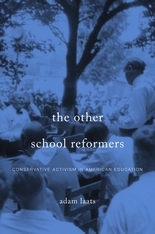Harvard University Press, 2015
Surprised by all the violence and anger about schools? Don’t be. As long as there have been public schools, they have been central parts of America’s incessant battle to define itself.
What have those arguments been about? What have conservatives wanted out of public schools? Why have the fights been so violent and so continuous?
Those are the questions I examined in this book. Today’s school wars are nothing new. For a full century, America has been caught in a brutal stalemate, never much moving the trenchlines that were dug in the 1920s. Behind every battle over race, religion, history, and sexuality, there is a looming truth that defines conservative educational activism. Namely, one kind of Make-America-Great-Again conservative has always assumed they had the sole right to define the goings-on in public schools. The rest of us don’t agree, and this chronic disagreement has exploded into acute battles whenever there is stress on the system.
In this book, I look in depth at four of the most notorious school fights of the twentieth century: the evolution battles of the 1920s; the history fights of the 1940s; the communist-scare of the 1950s; and the literature freakout of the 1970s. Time and time again, conservative activists said the kinds of things President Trump made famous again in the 21st century. They warned that a sinister conspiracy had taken over the American education system. They fretted that their religion was being spurned by callous elites. They violently battled to assert their presumed right to impose their vision on ALL public schools.
That’s my argument, anyway. Is it any good?
To find out, you can listen to an interview at National Review with John Miller.
Or read some reviews:
- In the pages of the Journal of American History, Kevin Kruse of Princeton University, author of One Nation Under God, had this to say:
Well researched, well written, and well argued, The Other School Reformers offers a clear, evenhanded account of conservative activism in public education.
- Or how about Andrew Petto’s take in the Reports of the National Center for Science Education, in which he says:
Laats’s analysis of the social and political contexts in which this [conservative] resistance [to educational reform] occurs makes this book a must-read for anyone interested in or hoping to effect educational reform—whether in the sciences or in other disciplines.
- No one knows more about conservative teachers and the history of efforts to teach anti-racism than Professor Zoe Burkholder. In the pages of the History of Education Quarterly, here are her thoughts on the book:
The Other School Reformers: Conservative Activism in American Education is the first comprehensive historical study of conservative educational activism in the United States. . . . Laats makes a compelling argument that a powerful tradition of educational conservatism has played a decisive role in shaping American public schools and culture from the 1920s through the present. . . . The Other School Reformers makes a vital contribution to the history of education by identifying a clearly discernable and politically powerful tradition of conservative educational reform in the United States since the 1920s. One of this book’s strengths is its ability to explain the connections between these four episodes separated by time and space, and also to account for such differences as the changing ways that conservative educational activists dealt with race and religion.
- Another good one from historian Emily Straus, in American Historical Review (January 2017) 122 (1): 189-190 (subscription required):
The Other School Reformers directly engages several historiographical discussions and will be of interest to historians in a variety of fields beyond the history of education and the history of conservatism. By looking at conservatives’ fights around education, the book fills in the shadow figures against whom progressives—a group that historians have written much more about—fought. It also broadens our understanding of conservatism in the twentieth century by illuminating the centrality of education. Any scholar interested in how to tell a national story through a local lens will also benefit from reading Laats’s work. By excavating conservatives’ activism around public school education and by helping to reframe the discourse around education, Laats’s account will enrich both historical and contemporary debates on education and politics.
- Then there’s Mike Wakeford’s opinion in the blog of the Society for US Intellectual History:
The Other School Reformers is about big ideas and big questions. At bottom it is a valuable portrait of how Americans vie, in an ongoing way, to answer the questions that matter most: Why do we educate? What are schools for? And, in the context of crosscutting claims about the intrinsic relationship between ‘education’ and ‘democracy,’ what has, does, and should each of those terms mean?
- And don’t forget Kunal Parker’s review essay in the Tulsa Law Review, in which he considers OSR along with Kevin Kruse’s One Nation Under God:
If we are wont to think that American conservatives mobilized in opposition to Communism or Socialism, secularism, or the political demands of women and minorities, both Kruse and Laats, but especially the latter, show us how much conservative opposition in America has been directed against a modernist philosophical tradition that is uniquely the country’s own. If American conservatives have long demonized unsavory ideas as foreign imports, they have also demonized the country’s own anti-foundational traditions.
5 thoughts on “The Other School Reformers: Conservative Activism in American Education”